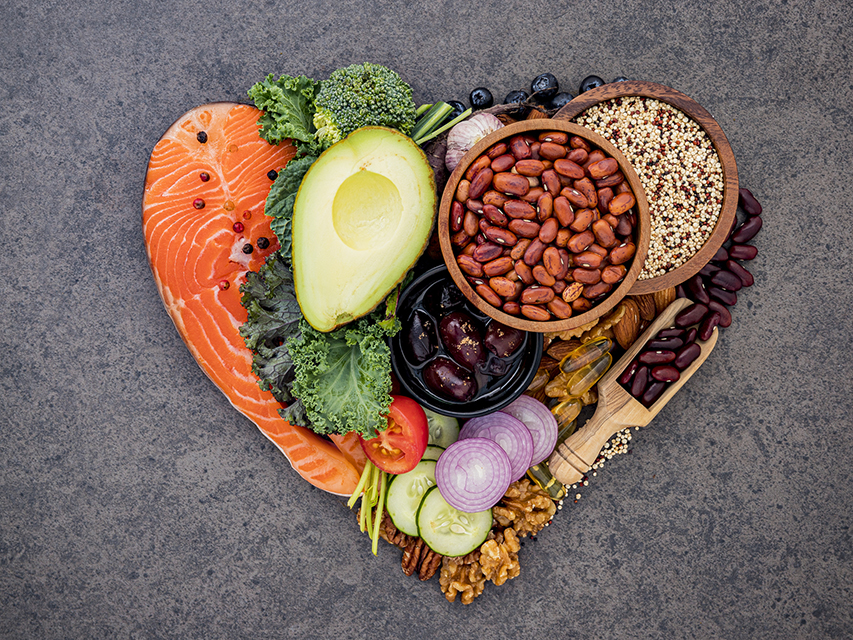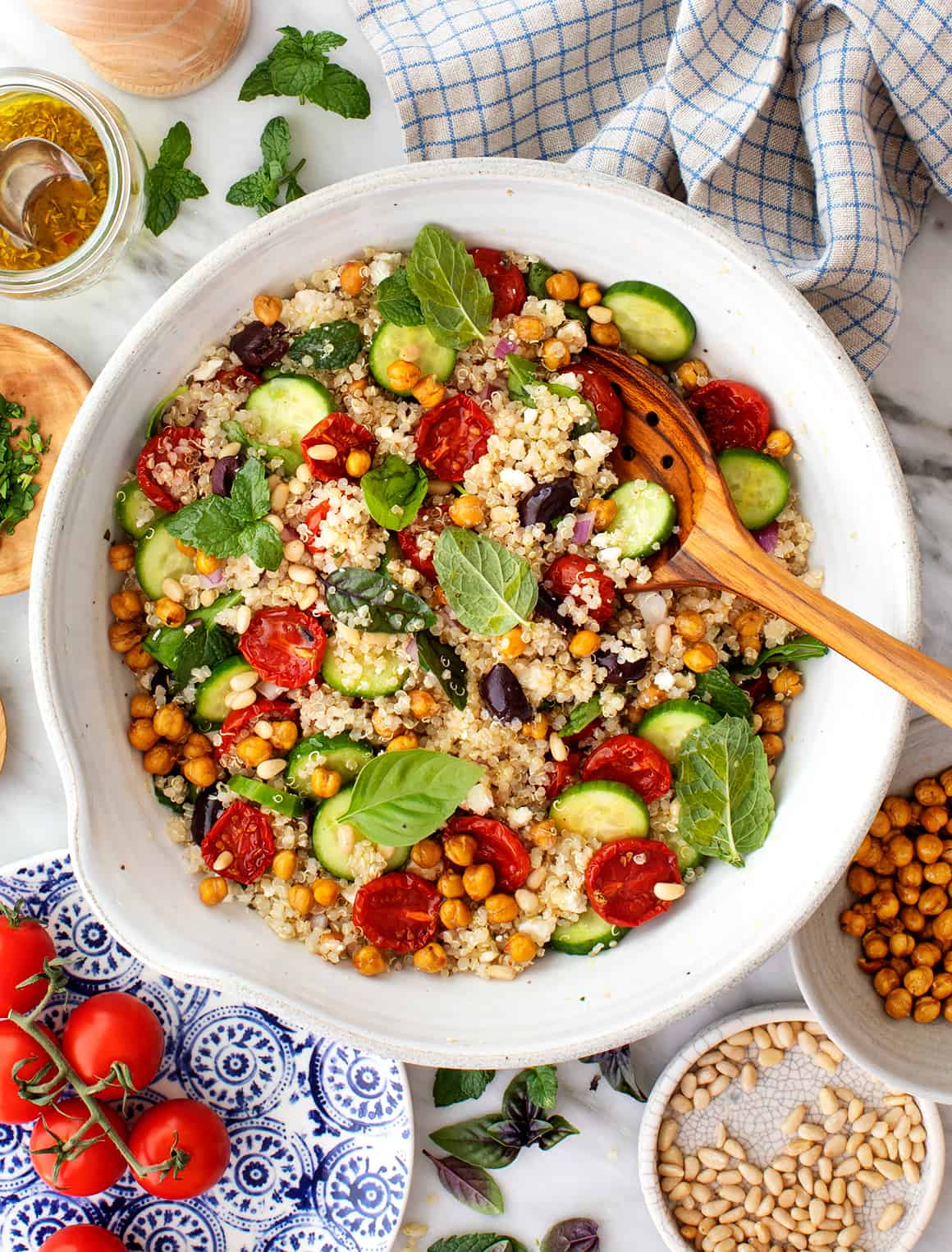The Heart-Smart Diet: Eating for a Healthy Ticker
Your heart is one of the hardest working muscles in your body. It pumps around 2,000 gallons of blood each day, beating roughly 115,000 times to circulate oxygen and nutrients throughout your system. Doesn’t it deserve some TLC through a nourishing, heart-healthy diet? Smart eating can protect your cardiovascular well-being now and for years to come. Here’s how to eat for a strong, vibrant heart.
Fill Up on High-Fiber Foods
Dietary fiber is a powerhouse nutrient for promoting heart health. It helps lower LDL “bad” cholesterol levels while providing fuel for friendly gut bacteria that create heart-protective compounds. Load up on fiber-rich plant foods like:
- • Beans, lentils, peas
• Berries
• Pears, apples with skin
• Cruciferous veggies like broccoli, Brussels sprouts
• Whole grains such as quinoa, oats, brown rice
• Seeds like chia, flaxseed
Aim for at least 25-30 grams of fiber per day for optimal heart benefits.
Choose Better Fats
Not all fats are created equal when it comes to cardiovascular effects. Trade artery-clogging saturated fats for these heart-smart unsaturated varieties:
- • Olive oil for cooking and dressings
• Avocados
• Nuts and seeds
• Fatty fish like salmon, mackerel, sardines
These foods provide anti-inflammatory omega-3s that improve cholesterol ratios and keep blood flowing freely. Coconut and avocado oils work well for high-heat cooking too.
Limit Sodium and Processed Meats
Excess sodium intake is a major driver of high blood pressure – the infamous “silent killer” that forces your heart to work overtime. Limit highly processed, sodium-dense foods like:
- • Deli meats, sausages, hot dogs
• Frozen meals, canned soups
• Chips, pretzels, crackers
• Restaurant meals
Opt for fresh, whole foods you can season sensibly with herbs and spices. Read nutrition labels and cap sodium below 2,300 mg per day.
Eat Antioxidant-Rich Produce
Deeply colored fruits and veggies are packed with antioxidants that neutralize cell-damaging free radicals linked to atherosclerosis (hardened arteries) and heart disease. Load up on:
- • Berries
• Red grapes
• Dark leafy greens
• Beets
• Sweet potatoes
• Tomatoes
• Citrus fruits
These plant foods are your heart’s perfect bodyguards against oxidative stress and inflammation.
Stay Hydrated With Healthy Beverages
Proper hydration ensures your blood can flow easily. Drink at least eight 8-ounce glasses of water daily. Tea (hot or iced) offers antioxidant benefits too. Avoid sugary beverages like sodas or juice drinks that spike inflammation. Moderate alcohol like one glass of red wine is fine, as it provides resveratrol antioxidants.
Cook With Anti-Inflammatory Herbs and Spices
Garlic, turmeric, cinnamon, ginger, cayenne and black pepper all possess potent anti-inflammatory compounds that promote healthy circulation and protect your ticker. Season generously with these delicious flavors.
Switch to Fatty Fish and Lean Protein
Fatty fish like salmon, sardines, mackerel and rainbow trout deliver hefty doses of heart-protective omega-3s. Aim for 2-3 servings per week. Round out meals with lean protein from:
- • Chicken or turkey breast
• Eggs
• Greek yogurt
• Beans and lentils
• Edamame
• Tofu
Choose Whole, High-Fiber Carbs
While limiting added sugars and refined starches, enjoy small portions of whole grains like quinoa, brown rice and oats. These fiber-filled complex carbs keep you feeling satiated while providing energy for your hard-working heart. Top with heart-healthy fats like olive oil, avocado or nuts for omega bonuses.
Go Nuts for …Nuts!
Nuts and seeds like walnuts, almonds, pecans, pistachios, chia and flax provide an incredible nutrient package for heart wellness. Their healthy unsaturated fats join forces with fiber, antioxidants, and minerals like magnesium to lower LDL cholesterol and reduce inflammation. Sprinkle them on salads, sides and snacks.
Be Smart About Coffee and Tea
Both coffee and tea can be part of a heart-healthy lifestyle in moderation. The antioxidants in each beverage may reduce heart disease and stroke risk when consumed in reasonable amounts. Just skip the sugary creamers and flavor syrups.
Indulge Smartly in Dark Chocolate
Got a sweet tooth? You’re in luck – dark chocolate in moderation can actually benefit your heart! The flavanols in dark chocolate help lower blood pressure and reduce inflammation. Choose bars with at least 70% cacao content and savor it slowly.
Balance With Portion Control
Even nutrient-packed whole foods can lead to weight gain when over-consumed. That excess adipose tissue strains your cardiovascular system. Practice portion control by using smaller plates, reading food labels, and stopping when pleasantly full. Moderation is key with all foods.
Stay Active to Support Heart Health
Diet alone isn’t an instant cure-all. Complementing your nutritious meals with regular exercise delivers a powerful one-two punch for cardiovascular wellness. Aim for 30-60 minutes of activity most days through:
- • Walking, hiking, jogging
• Cycling, swimming
• Strength training, yoga, Pilates
• Playing sports
The more you move, the better you’ll improve circulation and heart-protecting fitness.
Listen to Your Body’s Hunger Cues
Heart healthy diet:Your appetite and hunger signals will fluctuate day to day depending on activity levels, hormone cycles, stress and more. Practice tuning into your body’s true hunger and fullness cues rather than eating based on external schedules, emotions or environmental cues. This intuitive approach prevents over-consuming.
Minimize Processed and Ultra-Processed Foods
With a few exceptions, the more processed a food item is, the worse it tends to be for your heart. Ultra-processed foods are manufactured with lots of added sugars, sodium, unhealthy fats and artificial ingredients. Limit these items as much as possible:
- • Fast food
• Chips, crackers, baked goods
• Breakfast cereals
• Sugar-sweetened beverages
• Microwavable frozen meals
These ultraprocessed options have been stripped of nutrients and contain cheap, inflammatory ingredients.
Plan Out Sensible Indulgences
No one can eat perfectly 100% of the time. Give yourself grace by scheduling sensible indulgences into your routine. Identify less nutritious treats you enjoy, and work them into your diet in moderation without going overboard. This balanced approach prevents cravings and excessive deprivation backlash.
Don’t Fixate on Heart Rate Numbers
While monitoring your exercise heart rate can be motivating, worrying over daily heart rate fluctuations isn’t wise. Occasional spikes are normal responses to activity levels, stress, hormones, hydration status, etc. Focus on consistency with nutritious eating and regular movement instead.
Involve the Whole Family
Making sustainable diet changes is far easier when you involve the whole household! Cook heart-smart meals together, go grocery shopping for nutritious foods as a family, and keep junk snacks out of the house.Heart healthy diet: Normalize these healthy habits for kids from an early age.

Build Habits Gradually
Transforming your diet requires patience and consistency – not overnight overhauls that inevitably backfire. Introduce one simple change per week, like cooking more vegetarian meals or snacking on nuts over chips. Address one change at a time, tweaking and adapting your routine. Steady progress wins the race.
Ultimately, there’s no single heart-healthy diet that fits all. Focus on consuming more whole, nutrient-dense foods like vegetables, fruits, whole grains, fatty fish, nuts and seeds. Keep sodium, saturated fat and processed fare to a minimum. Listen to your body’s signals. Move daily. And don’t stress over perfection – do your best to nourish your amazing heart one wholesome meal at a time. Your ticker will love you for it!



